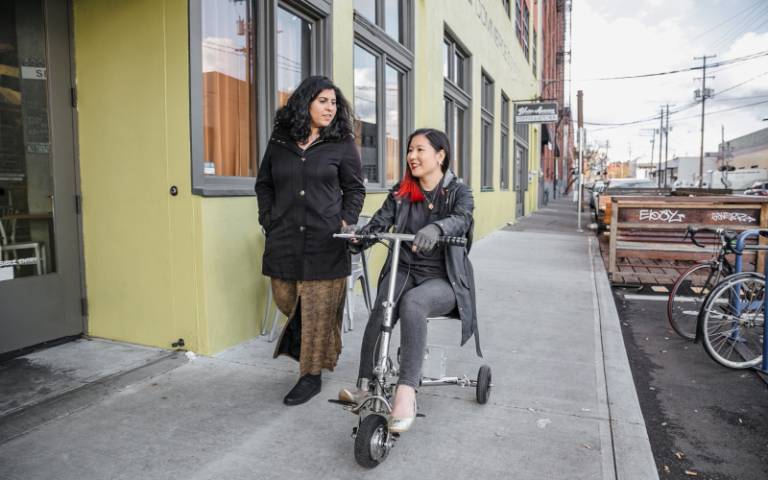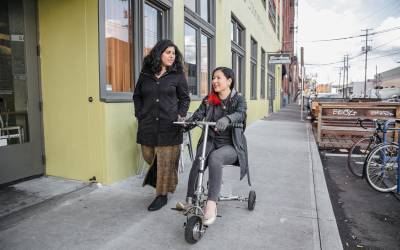UK Disability History Month 2023 will take place from 16 November to 16 December. Find out about UCL events, key resources and other information marking the month.

In this article:
Foreword by Indie Beedie, UCL Disability Equality Envoy and Co-Chair of the UCL Disability Equality Steering Group, and Suzanna Chen, Disabled Students Officer at the UCL Students’ Union.
UK Disability History Month (UKDHM) is a period dedicated to recognising that disability is a natural part of human existence and diversity, and that the negative connotations and limitations associated with disability are manifestations of inaccessible environments and socially produced oppression. The paradigm adopted by UCL is called the social model of disability, and it has significant implications for how disabled people are treated in society and how disabled people see themselves.
Disability History Month is also a time to reflect on the history of disabled people fighting for equality and how far society has come over the years. At UCL, it’s a time to reflect on UCL’s eugenics legacy, Francis Galton and the impact eugenics has had on the disability community. We are proud to have begun to address our eugenics legacy as an institution and are continuing on that path with our Eugenics Heritage Education Project.
The theme of UKDHM 2023, “Disability, Childhood and Young People”, is particularly relevant for students as it focuses on young people with disabilities. Data collected by the UK government in 2021 suggests that although the number of students with disabilities in higher education is increasing, they are more likely to drop out and those who do complete a degree tend to have lower degree success rates than their non-disabled peers.
These disparities are worth addressing, as students with disabilities make up around 16% of the university’s student population, more than 7,000 people. A survey conducted by UCL’s Disabled Students Network (DSN) in 2019 found that 67% of disabled students who responded reported experiencing disability discrimination at UCL. Students with a range of disabilities also cited specific issues such as bureaucratic adjustment processes, inaccessible physical environments, additional costs related to disabilities, and discriminatory attitudes as negative aspects of their experience at UCL.
UCL is proud of its history and commitment to providing access to higher education for underrepresented students and has made accessibility a fundamental principle. UCL accommodates students and staff with disabilities with supports such as physical access arrangements and digital accessibility tools, but recognises there is still work to be done to deliver a truly accessible education delivery and working environment.
There is power in community and colleagues across the University are working to improve accessibility and disability inclusion within and beyond UCL. The many ways in which disabled and non-disabled students and staff contribute to a more accessible environment for all – from medical students challenging the language used to describe disability in the curriculum, student-led assistive technology projects, UCL Arena’s inclusive teaching resources, faculty-led projects such as ‘Disability and Student Access to Law Practice’, to disabled student- and staff-run groups and peer support networks – should be recognised and celebrated throughout this month and beyond.
Although 7% of UCL staff declare a disability, we know that working-age adults with a disability make up 23% of the UK population (ONS, 2023). This suggests that the number of working-age adults with a disability at UCL is higher than reported. Even taking the figure of 7% alone, it is a significant number of people who identify as disabled within our community. If you would like to declare a disability, you can do so through Inside UCL.
Disabled staff also reported challenges such as oppressive practices, prejudice and barriers to career progression. We all need to work together to change the culture at UCL and make it a more inclusive environment for disabled staff and students. This starts with moving away from the deficit model and embracing the diversity of experiences and thoughts that the disability community can offer. Adaptations for disabled staff and students benefit all of us, not just the disability community. For example, typewriters and keyboards, electric toothbrushes and closed captioning are things we all use in our daily lives and are designed for disabled people. This also applies to the adaptations we make as an institution for students and staff, such as access to lecture recordings and flexible working patterns.
Being a disabled person can be challenging in both subtle and pervasive ways, but UCL has an incredible community of disabled staff, students and supporters who are committed to accessibility and disability inclusion, and this month is for you.
[Back to top]
Check this page regularly for the latest UCL events, podcasts and key resources taking place this month, and mark your calendars for Sunday 3 December, when we’ll be lighting up the Portico purple to mark the International Day of Persons with Disabilities.
event
November 21, 5-7pm: London (Blaine) Fog: Long Corona and Apathy with Clip of Colour Criticism
In this talk, Xine Yao will present tentative work towards a new project that draws from her award-winning monograph DISAFECTED to deploy unsentimental racial and sexual politics as a colorist framework. In-person participation is open to all.
November 23, 1-2pm: Disability Innovation Lecture: Meeting people’s basic needs now and in the future
We invite you to a special lunchtime talk and Q&A with Dr Rosie Gowran, UCL Professor Emeritus, Clinical Lead for the National Clinical Programme for Disability, Associate Professor of Occupational Therapy and Programme Director at the University of Limerick, Ireland. This face-to-face event is open to all.
23 November, 4-6pm: Disability History Month, Archive Drop-in Sessions at LSE
This exhibition from the LSE archives includes materials from suffragette Rosa May Billinghurst, papers from the Maternity Alliance Disability Working Group (now Maternity Action, a maternal rights charity), the GEMMA newsletter, the Disabled Gay Men’s Group newsletter and the Disability Income Group (DIG). Come in person – entry is open to all.
23 November, 5pm – 8.30pm: DCAL (UCL) LGBTQ+ BSL Glossary Event: Deaf Drag Fun Night
This is a fantastic opportunity to embrace inclusivity, learn British Sign Language (BSL) glossary terms and have fun in a safe and supportive environment. It’s face-to-face and open to all.
December 1st, 2pm-3pm: International Day of Persons with Disabilities Conference 2023
Join UCL Student Support and Wellbeing to celebrate International Day of Persons with Disabilities on Friday 1 December 2023. UCL students and staff are welcome to join online.
Dec. 6, 2-3 p.m.: Supporting Students with Disabilities and Neurodevelopmental Disabilities in Higher Education: Student Success Series (online)
The Student Success Staff Speaker Series takes place every two months from October to March and brings in higher education practitioners to help raise awareness of the issues faced by students with disabilities in higher education. Online/UCL staff are welcome to attend.
December 11, 2-3pm: Women with Disabilities in Academia panel event
This panel event brings together women with disabilities at different stages of their careers in academia to reflect on their journey so far and explore what support is available and what is still needed in academia for the empowerment of women with disabilities. Online/open to university staff.
[Back to top]
Student Support
[Back to top]
Staff Support
[Back to top]
Inclusive Education Resources and Events
[Back to top]
Further information, resources and links
[Back to top]
Image credit
Image courtesy of the Disabled and Here collection, a site that provides free, inclusive stock images of people with disabilities.
[Back to top]

